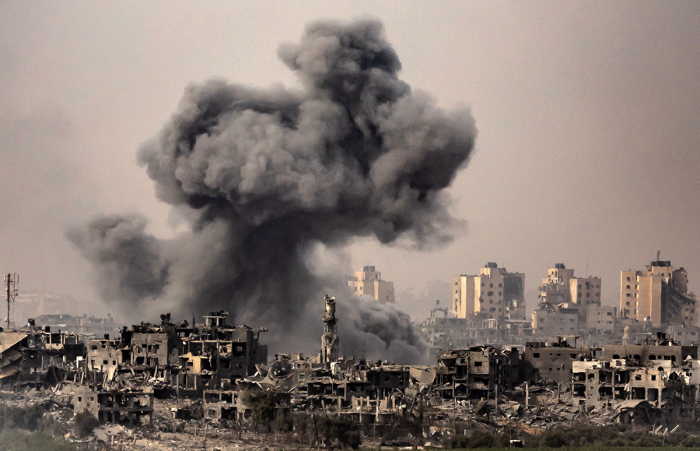United Methodist Church Council of Bishops calls for ceasefire in Gaza

The United Methodist Church is calling for a ceasefire in the war between Israel and Hamas, citing the humanitarian crisis that has hit the Gaza Strip since the conflict began last October.
The UMC Council of Bishops released a statement Thursday calling for “an immediate and permanent cease-fire in the conflict between Hamas and Israel in Gaza and pledge our prayers and commitment to work for a durable peace for Israelis, Palestinians, and all in the region.”
“The ability of aid organizations to attend to the critical needs of the victims of this prolonged war has also been sharply limited by the lack of meaningful negotiations,” stated the bishops.
“It is estimated that 1.8 million Palestinians have been displaced, their homes and communities destroyed. The United Nations estimates that more than half a million people are living under ‘catastrophic levels of deprivation and starvation.’”
The bishops contend that “the current military strategy of the Israeli government, supported by U.S. weapons transfers and aid, will only lead to the destruction of the entire Gaza Strip, an unconscionable death toll that grows daily, the perpetuation of one of the world’s longest conflicts, and the proliferation of increased enmity between Israelis and Palestinians.”
“The lack of a true cease-fire after more than five months of this deadly conflict compels us to raise our voices now,” the UMC leaders added. “We pledge our prayers and commitment to work for a durable peace, an end to the violence and the release of the hostages.”
On Oct. 7, the Islamic terrorist group Hamas, which has controlled the Gaza Strip since 2007, launched a surprise attack on southern Israel, killing at least 1,200 people, mostly civilians, and abducting around 240 hostages.
In response, Israel launched a military offensive in Gaza with the aim of eradicating Hamas and securing the release of the hostages. The Hamas-run Gaza Health Ministry states that over 30,000 Palestinians have been killed since the war began. The Gaza Health Ministry's figures don't distinguish between armed militants and unarmed civilians.
While Hamas' death toll figures have been cited by media and advocates accusing Israel of genocidal actions, some commentators have expressed skepticism concerning the authenticity of figures provided by Hamas.
In late February, Israel Defense Forces said at least 12,000 Hamas fighters have been killed since the war began. Israel has maintained throughout the war that its fighters do the best they can to avoid civilian casualties in a complex urban environment in which Hamas has been accused of using civilians as human shields.
"Not only do official Palestinian death counts fail to differentiate soldiers from children, but Hamas also blames all deaths on Israel even if caused by Hamas’ own misfired rockets, accidental explosions, deliberate killings, or internal battles," wrote Abraham Wyner, a professor of statistics and data science at the Wharton School of the University of Pennsylvania, in a recent piece for the Jewish news magazine Tablet.
"One group of researchers at the Johns Hopkins Bloomberg School of Public Health compared Hamas reports to data on UNRWA workers. They argued that because the death rates were approximately similar, Hamas’ numbers must not be inflated. But their argument relied on a crucial and unverified assumption: that UNRWA workers are not disproportionately more likely to be killed than the general population. That premise exploded when it was uncovered that a sizable fraction of UNRWA workers are affiliated with Hamas. Some were even exposed as having participated in the Oct. 7 massacre itself."
The violence in Gaza has led many Christian denominations and organizations in the United States to call for a permanent ceasefire between Hamas and Israel.
Earlier this month, for example, the Conference of Bishops of the Evangelical Lutheran Church in America sent a letter to President Joe Biden imploring him to “do everything in your power to bring an end to the current suffering and lay the foundation for lasting peace with justice.”
“We mourn the loss of 1,200 precious lives in Israel on Oct. 7 by the actions of Hamas and the trauma for those 250 others who were taken hostage. We mourn the loss of over 30,000 precious lives in Gaza — including tens of thousands of women and children — who have died in Israel’s military action since then,” the ELCA bishops stated.
“Too many have suffered. Too many lives have been lost. Strong U.S. leadership is needed to help bring a comprehensive permanent cease-fire, an end to the occupation and lasting peace.”
Others have argued that a ceasefire would benefit Hamas and other terrorist groups based in the Gaza Strip, who have not hidden their desire to destroy the nation of Israel.
Last month, the United States vetoed a draft United Nations Security Council resolution that would have called for an immediate ceasefire, arguing that it would be counterproductive. The U.S. proposed its own draft ceasefire resolution to the U.N. Security Council calling for a "temporary ceasefire in Gaza as soon as practicable based on the formula of all hostages being released, and calls for lifting all barriers to the provision of humanitarian assistance at scale."
"Demanding an immediate, unconditional ceasefire without an agreement requiring Hamas to release the hostages will not bring about a durable peace. Instead, it could extend the fighting between Hamas and Israel," stated U.S. Ambassador to the U.N. Linda Thomas-Greenfield, as quoted by Reuters.
In a background press call last week, a senior Biden administration official claimed that Hamas is holding up negotiations for a six-week ceasefire deal by refusing to release a certain number of vulnerable hostages.
A senior Israeli defense official said in an interview with The Jerusalem Post last week that Hamas has been stealing aid supplies Israel and other countries have sent to Gaza and selling them for more than their worth on the black market.





























